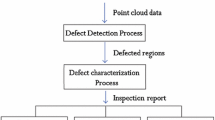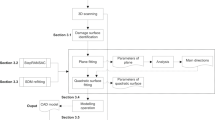Abstract
In the production of industrial products, surface defect detection is mostly carried out through manual inspection. However, this detection method has several shortcomings, such as low efficiency, limited accuracy, and high inspection costs. To address these issues, we design an improved random sampling consistency (RANSAC) algorithm based on adaptive parameters of 3D point cloud data for plane defect detection. The main steps of our algorithm include the down sampling function which contains adaptive parameters, optimized based on KD-tree proximity substitution method. Our algorithm also includes the RANSAC segmentation and fitting plane function of adaptive parameters. Experimental results demonstrate that our algorithm can accurately identify protrusions or indentations defects of 1 mm or larger in those planes based on point clouds data, with a recognition rate more than 90%. The experimental results validate the suitability of our algorithm for industrial applications, offering an efficient and cost-effective solution for plane defect detection.
Access this chapter
Tax calculation will be finalised at checkout
Purchases are for personal use only
Similar content being viewed by others
References
Luo, Q., Fang, X.: Automated visual defect detection for flat steel surface: a survey. IEEE Trans. Instrum. Meas. 69(3), 626–644 (2020)
Garcia, N.M., de Erausquin, I., Edmiston, C., Gruev, V.: Surface normal reconstruction using circularly polarized light. Opt. Express 23(11), 14391–14406 (2015)
Zhang, K.: Study on fast detection method of defects of automobile painting surface. DongHua University (2015)
Wolf, K., Roller, D., Schäfer, D.: An approach to computer-aided quality control based on 3D coordinate metrology. J. Mater. Process. Tech. 107(1), 96–110 (2000)
Lichun, S., Yun, Y.: Filtering of airborne LiDAR point cloud data based on car(p, q) model and mathematical morphology. Acta Geod. Cartogr. Sin. 41(2), 219–224 (2012)
Perona, P., Malik, J.: Scale-space and edge detection using anisotropic diffusion. IEEE Trans. Pattern Anal. Mach. Intell. 12(7), 629–639 (1990)
Meiju, L., Rui, Z.: Application of improved Otsu threshold segmentation algorithm in mobile phone screen defect detection. In: 2020 Chinese Control And Decision Conference (CCDC), Hefei, China, pp. 4919–4924 (2020)
Charles, R.Q., Su, H., Kaichun, M., Guibas, L.J.: PointNet: deep learning on point sets for 3D classification and segmentation. In: 2017 IEEE Conference on Computer Vision and Pattern Recognition (CVPR), Honolulu, HI, USA, pp. 77–85 (2017)
Qi, C.R., Yi, L., Su, H., Guibas, L.J.: PointNet++: deep hierarchical feature learning on point sets in a metric space. In: Proceedings of the 31st International Conference on Neural Information Processing Systems (NIPS’17), NY, USA, pp. 5105–5114 (2017)
Wu, W., Qi, Z., Fuxin, L.: PointConv: deep convolutional networks on 3D point clouds. In: IEEE/CVF Conference on Computer Vision and Pattern Recognition (CVPR), Long Beach, CA, USA, pp. 9613–9622 (2019)
Li, Y., Junxiang, T., Hua, L.: Registration of TLS and MLS point cloud combining genetic algorithm with ICP. Acta Geod. Cartogr. Sin. 47(4), 528–536 (2018)
Andrew, W., Amanatides, J.: Voxel occlusion testing: a shadow determination accelerator for ray tracing. In: Proceedings of the Conference, Halifax, Nova Scotia, Canada, pp. 1–2 (1990)
Sijie, T., Ruilin, B.: Point cloud registration method based on key point optimization after downsampling. Appl. Res. Comp. 38(03), 904–907 (2021)
Fischler, M.A., Bolles, R.C.: Random sample consensus: a paradigm for model fitting with applications to image analysis and automated cartography. Commun. ACM 24(6), 381–395 (1981)
Author information
Authors and Affiliations
Corresponding author
Editor information
Editors and Affiliations
Rights and permissions
Copyright information
© 2024 The Author(s), under exclusive license to Springer Nature Singapore Pte Ltd.
About this paper
Cite this paper
Bai, M., Wu, S., Ma, H., **, Y. (2024). Plane Defect Detection Based on 3D Point Cloud. In: **n, B., Kubota, N., Chen, K., Dong, F. (eds) Advanced Computational Intelligence and Intelligent Informatics. IWACIII 2023. Communications in Computer and Information Science, vol 1932. Springer, Singapore. https://doi.org/10.1007/978-981-99-7593-8_6
Download citation
DOI: https://doi.org/10.1007/978-981-99-7593-8_6
Published:
Publisher Name: Springer, Singapore
Print ISBN: 978-981-99-7592-1
Online ISBN: 978-981-99-7593-8
eBook Packages: Computer ScienceComputer Science (R0)




